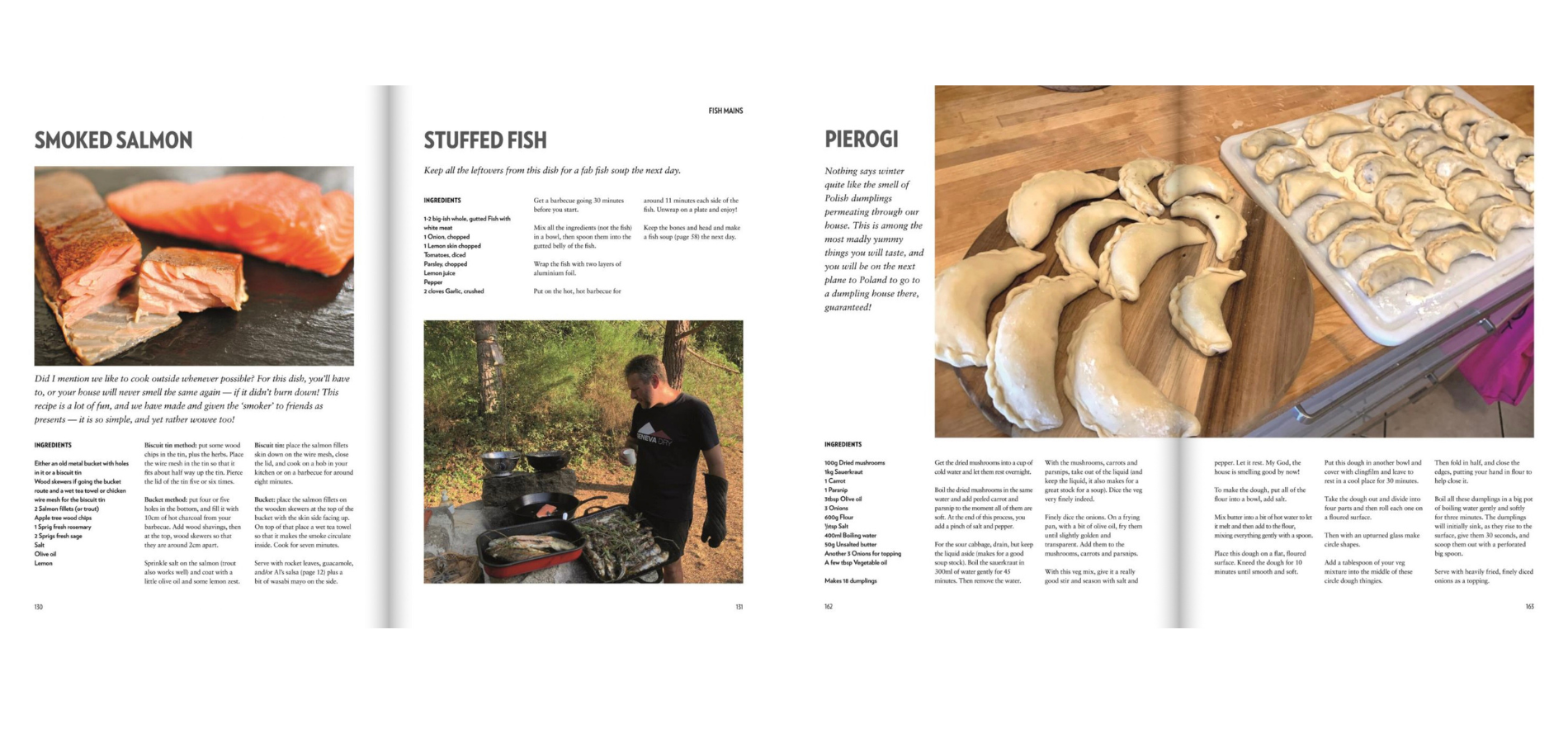For many, a well-worn cookbook is more than just recipes; it it’s a living repository of memories, a tangible link to family history. For maritime journalist and publishing veteran Sam Chambers, this sentiment rings especially true, forming the very genesis of his unexpected new cookbook, “Fiery Food.” The inspiration for this culinary journey was born from a persistent, loving nudge from his daughter, rooted deeply in a cherished family tradition.
“Fiery Food” is more than a cookbook; it’s also a philanthropic endeavor. All proceeds from its sales are dedicated to OneSky, an organization committed to uplifting children from marginalized communities across Asia, ensuring they have the chance to thrive.
The Red Ring Binder: A Seed Planted Decades Ago
The story of “Fiery Food” begins, quite humbly, with a simple red ring binder. For over two decades, this binder has held a prominent spot on a shelf in Sam’s home, its pages crammed with typed recipes and culinary clippings. This collection, a labor of love, was meticulously compiled and gifted to him by his mother more than 20 years ago. Each page, each recipe, evokes a powerful sense of childhood—the smells, the tastes, the warmth of his mother’s kitchen.
“It was an earlier seed staring me in the face each and every day,” Sam recounts, looking back at the binder that held his past.
Fast forward to the present year, and Chambers found himself sharing this very binder with his own daughter, Kaiha. What began as a nostalgic show-and-tell quickly transformed into a determined plea from Kaiha: she wanted her own version. A similar, personalized cookbook filled with her father’s recipes. Initially, Sam dismissed the idea, wondering aloud how he could possibly carve out the time for such a demanding undertaking amidst his already hectic schedule.
An Unexpected Catalyst: Downtime and Determination
The turning point for “Fiery Food” arrived unexpectedly in October 2024. Sam traveled back to the UK to spend time with his ailing father, whose health was steadily declining. This period, surprisingly, offered a rare and precious window of downtime.
“I didn’t have to work. I didn’t have all of the family around me, just my old two parents. And so there was a lot of sitting around,” Sam explains. In this quiet, reflective space, the persistent request from his daughter resurfaced, accompanied by a powerful realization. “If I don’t do it now, I never will,” he told himself. That quiet resolve ignited the project.

From Ring Binder to Global Cookbook: A Project “Gone Mad”
What began as a simple endeavor for his daughter, an updated version of that cherished red ring binder, quickly escalated. “The project goes a bit mad very quickly,” Sam admits with a laugh. As he started compiling recipes, new ideas began to sprout.
“Then I thought, it would be nice to do some photos,” he recalls. “And then I thought, it’d be nice to give it to my nephews, my sisters, brothers, blah, blah, blah.” But the sheer thought of printing all those pages and stuffing them into multiple ring binders felt like “a hassle.”
This is where Chambers’ professional life as a publisher in Hong Kong serendipitously intersected with his personal passion project. Being deeply entrenched in the publishing world, with designers, printers, and distribution networks all based out of Hong Kong, he saw a path. He reached out to his trusted design partner with a bold proposition: “Can we do a book?”
Remarkably, fortune favored the ambitious timeline. A last-minute cancellation at a printer secured them an incredibly cheap slot. The catch? A daunting deadline that would push the project from concept to finished product in an astonishingly short period—six weeks from beginning to end.
Despite the breakneck pace, Sam decided to inject even more fun and community into the book. He reached out to family and friends, asking each for their one go-to, crowd-pleasing, simple recipe—something easy to make that always brought smiles. The response was overwhelmingly positive, adding layers of personal connection and diverse flavors to the burgeoning cookbook.
During his time back in the UK, another piece of the family’s rich culinary heritage emerged. “My mum showed me a book of her great-aunt,” Chambers shares. This tattered, beautiful black book, filled with elegant, old-fashioned handwriting, was his great-great-aunt’s recipe book, at least a century old. These precious, time-honored recipes, simple yet profoundly meaningful, found their place in “Fiery Food,” weaving together generations of family cooking.
A Charitable Twist: From Personal Passion to Philanthropic Purpose
What began as a deeply personal project for his daughter, “Fiery Food” soon found an unexpected path to wider distribution and, more importantly, a profound charitable cause. Sam’s long-standing connection to the Foreign Correspondents’ Club (FCC) in Hong Kong, coupled with a friendship rooted in philanthropy, provided the perfect platform.
The bridge to OneSky came through a good friend and fellow FCC member, Tim Huxley, who was once also a board member of OneSky. With Tim’s strong connections within the FCC, the plan quickly solidified. Thus, “Fiery Food” transformed from a personal tribute to a daughter’s wish into a meaningful initiative, leveraging a cherished community hub to support OneSky’s vital work for children from marginalized communities.
“Fiery Food”: A Global Tapestry of Simple Delights
“Fiery Food,” while conceived and created in Hong Kong, boasts an impressive international flavor. “There’s something like 190 recipes from around 40 different places,” Sam estimates, highlighting the book’s core philosophy. This cookbook is a global culinary journey, combining recipes from Korea, Uyghur, Chinese, Italian, Thai, and Singaporean cuisines, offering a diverse range from meat to vegetarian dishes. It is also a community effort, featuring favorite recipes from friends, family, and even Sam’s beloved grandmothers.
It’s designed to be “something about the love of sharing food with people from all over the world, from any background, in beautiful environments.”
When asked about his personal favorites from the diverse collection, Sam quickly points to the limoncello cocktail. “If you want a good party, the limoncello cocktail is 100% easy. And not expensive, which is another bonus,” he enthuses. “That’s a bit of a winner.”
Another standout, and arguably what Sam and his wife are “best known for,” is the pizza recipe, prominently featured on the book’s cover and in its center pages. This comes from their popular pizza parties, which often host 60 to 65 guests. With a pizza oven that can only fit one pizza at a time, “you can’t afford for the pizza dough not to be perfect when you’ve got a huge queue of people,” he explains, underscoring the importance of a reliable recipe.
For Sam Chambers, cooking and sharing food acts as the “glue that binds families and friends together,” bringing people closer through sitting, cooking, and eating—much like how OneSky provides a home away from home for marginalized families with children aged 0-6 years old, fostering connection and belonging.
The finished book has been a delightful surprise to its contributors. “A lot of people just expected it to be a ring binder, and they are surprised to receive a well-finished book.” Sam emphasizes that all the recipes are intended for readers to replicate and enjoy themselves, fostering that same spirit of shared culinary delight and encouraging everyone to embark on their own culinary experiments at home.
“Fiery Food” is more than a collection of recipes; it’s a celebration of family, community, and the profound impact of giving. Readers are not only able to gain access to a world of delicious, easy-to-make dishes but also directly contribute to OneSky’s mission, helping to ensure that every child has the chance to thrive.
Get a copy from the Foreign Correspondents’ Club with all proceeds going to OneSky.




